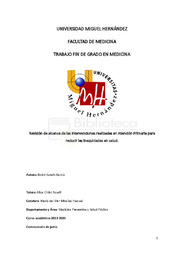Please use this identifier to cite or link to this item:
https://hdl.handle.net/11000/34009Revisión de alcance de las intervenciones realizadas en Atención Primaria para reducir las inequidades en salud.
| Title: Revisión de alcance de las intervenciones realizadas en Atención Primaria para reducir las inequidades en salud. |
| Authors: Canals García, Belén |
| Tutor: Chilet Rosell, Elisa Miralles Pascual, María del Mar |
| Editor: Universidad Miguel Hernández |
| Department: Departamentos de la UMH::Salud Pública, Historia de la Ciencia y Ginecología |
| Issue Date: 2024-05-13 |
| URI: https://hdl.handle.net/11000/34009 |
| Abstract: Introducción: Las desigualdades en salud son diferencias sistemáticas, evitables e injustas entre diferentes grupos socioeconómicos basadas en los determinantes sociales de la salud. A consecuencia de ello, en los grupos afectados se observan mayores tasas de morbimortalidad. Estas desigualdades se deben abordar desde políticas públicas y acciones en el sistema de salud, especialmente desde la Atención Primaria, que gracias a su función comunitaria y su capacidad para adaptarse a las necesidades sociales y de salud de la población adopta un papel fundamental en el desarrollo de intervenciones efectivas. Hasta el momento, la evidencia sobre intervenciones específicas para reducir estas desigualdades es limitada. Por ello, el objetivo de este trabajo es identificar y describir intervenciones específicas realizadas desde Atención Primaria para reducir inequidades en salud. Métodos: Revisión de alcance a través de la base de datos PubMed. Tras la introducción de la ecuación de búsqueda, obtuvimos 1250 artículos, de los cuáles 143 cumplían criterios de inclusión y se leyeron a texto completo. Se incluyeron todos aquellos estudios que trataban de intervenciones diseñadas con el objetivo de prevenir o reducir desigualdades en salud desde los servicios de Atención Primaria. La intervención debía ser evaluada cualitativa o cuantitativamente en términos de equidad en salud e ir dirigida a grupos vulnerables. Finalmente, quedaron incluidos 51 artículos de los que se realizó la extracción de datos y análisis descriptivo. Resultados: Se analizaron 51 artículos. La mayoría de las intervenciones se llevaron a cabo en Estados Unidos (29,4%), implementándose en España únicamente cuatro (7,8%). Por lo general, presentaron una duración mayor de 24 meses (39,2% de los estudios). En la mitad de las intervenciones, la población diana fueron grupos de personas de zonas con bajos ingresos o comunidades excluidas (54,9%) y los programas multicomponente de intervención preventiva o de gestión de pacientes con formación de personal fueron el tipo de intervención que más se desarrolló (un 43,1% de las intervenciones estudiadas). Mejorar el acceso a la Atención Primaria (21,5%) y aumentar la participación en programas de prevención (17,6%) fueron los principales problemas de salud abordados. Los resultados se evaluaron principalmente mediante comparación previa y posterior a la implementación de la intervención (29,4%), evaluación sin grupo control (27,4%) y mediante ensayo aleatorio controlado (21,5%). Los resultados observados en términos de equidad en salud reflejaron mejorías en el uso del sistema sanitario o social y de los programas preventivos de cribado del cáncer (45%) y equidad sanitaria mediante una variable indirecta (45%). Conclusiones: Existen múltiples intervenciones dirigidas a mitigar las inequidades en salud desde Atención Primaria, aunque muchas de ellas no son directamente aplicables en nuestro entorno. Se requiere indagar más en el desarrollo de intervenciones efectivas a través de la acción conjunta política, profesional y comunitaria, no por ello dejando de poner en práctica aquellas que ya son aplicables. Introduction: Health inequalities are systematic, avoidable and unfair differences between different socio-economic groups based on the social determinants of health. As a result, affected groups have higher morbidity and mortality rates. These inequalities must be addressed through public policies and actions in the health system, especially in Primary Care, which, thanks to its community function and its capacity to adapt to the social and health needs of the population, plays a fundamental role in the development of effective interventions. So far, the evidence on specific interventions to reduce these inequalities is limited. Therefore, the aim of this paper is to identify and describe specific interventions carried out in primary care to reduce health inequalities. Methods: Scoping review through the PubMed database. After entering the search equation, we obtained 1250 articles, of which 143 met the inclusion criteria and were read in full text. All studies dealing with interventions designed with the aim of preventing or reducing health inequalities in Primary Care services were included. The intervention had to be evaluated qualitatively or quantitatively in terms of health equity and target vulnerable groups. Finally, 51 articles were included for data extraction and descriptive analysis. Results: 51 articles were analysed. Most of the interventions were carried out in the United States (29.4%), with only four implemented in Spain (7.8%). In general, they lasted longer than 24 months (39.2% of the studies). In half of the interventions, the target population was groups of people from low-income areas or excluded communities (54.9%) and multicomponent preventive intervention or patient management programmes with staff training were the most developed type of intervention (43.1% of the interventions studied). Improving access to Primary Care (21.5%) and increasing participation in prevention programmes (17.6%) were the main health problems addressed. Outcomes were evaluated mainly by pre- and post-intervention comparison (29.4%), evaluation without control group (27.4%) and randomised controlled trial (21.5%). Outcomes observed in terms of health equity reflected improvements in the use of the health or social system and cancer screening preventive programmes (45%) and health equity using a proxy variable (45%). Conclusions: There are many interventions aimed at mitigating health inequalities in Primary Care, although many of them are not directly applicable in our setting. More research is needed on the development of effective interventions through joint political, professional and community action, while continuing to put into practice those that are already applicable. |
| Keywords/Subjects: intervenciones Atención Primaria desigualdades en salud |
| Knowledge area: CDU: Ciencias aplicadas: Medicina |
| Type of document: info:eu-repo/semantics/bachelorThesis |
| Access rights: info:eu-repo/semantics/openAccess |
| Appears in Collections: TFG- Medicina |
.png)

